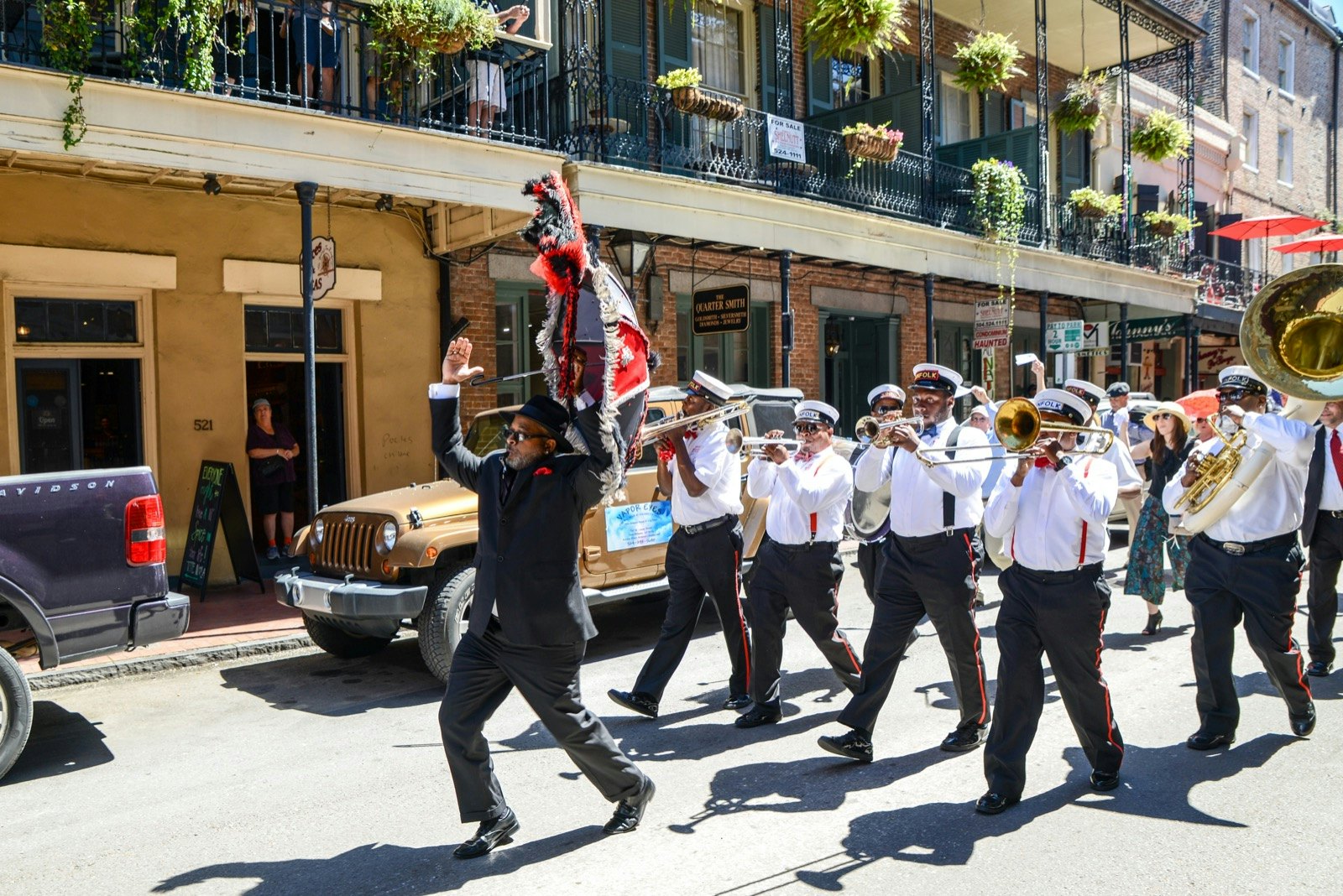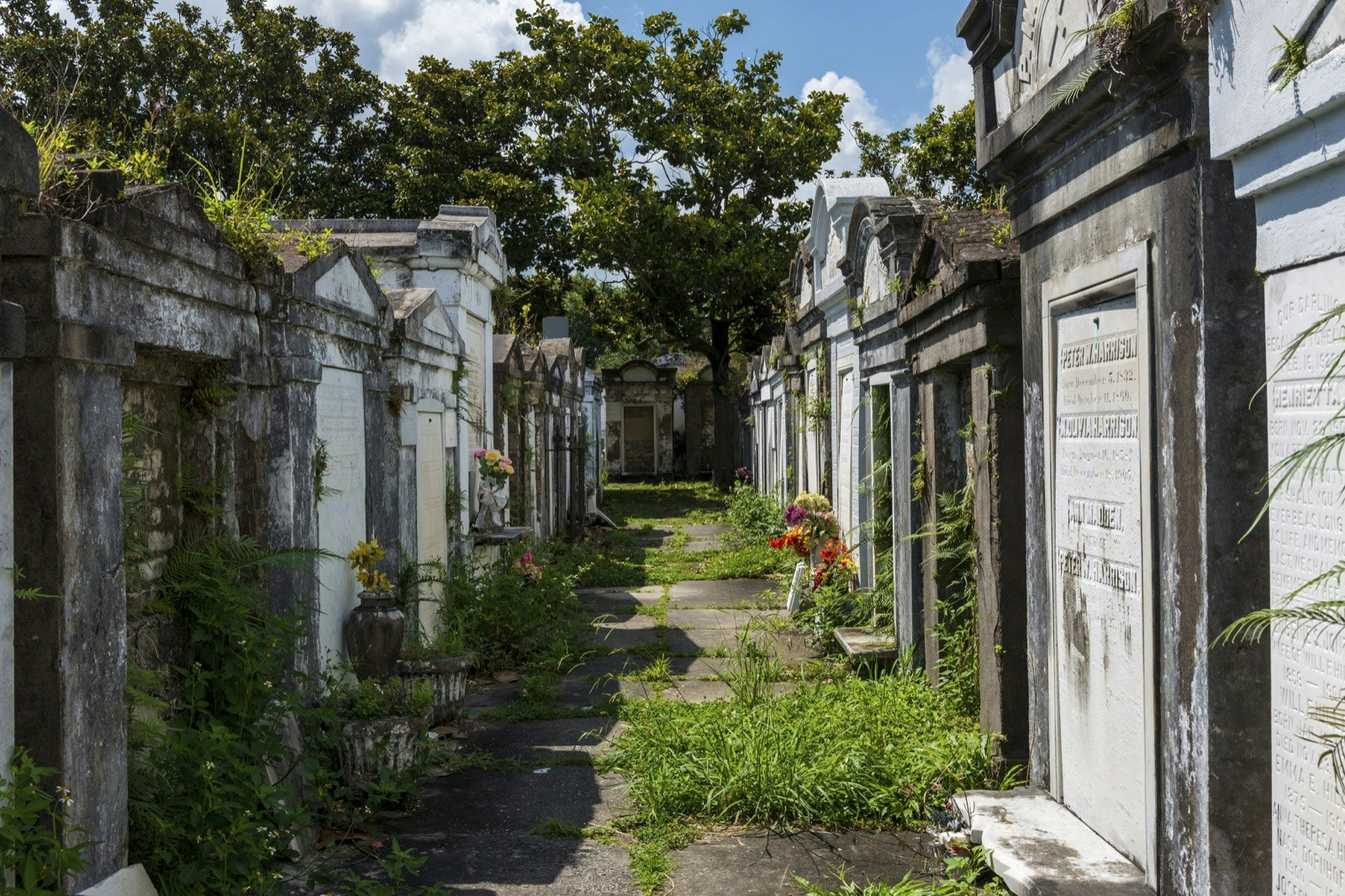
20 free things to do in New Orleans: experience the city on a budget
Dec 3, 2022 • 7 min read

From free music and events like Mardi Gras to historic architecture and beautiful scenery, here are the best free experiences in New Orleans © Bob Sacha / Getty Images
New Orleans is a good value-for-money city, and not just because the drinks are cheap.
The city that gave the USA carnival season is itself a sort of perpetual carnival, a place where spectacle and performances are constantly on offer to even the casual visitor – all at little to no cost. These are the top free experiences in New Orleans to help you save your dollars.
1. Mardi Gras is a free party, and it's fantastic
Few cities are as defined by an event the way Mardi Gras defines New Orleans. The holiday, which hits in February or March depending on the year, has been called the greatest free show on Earth, and it's an explosion of color, costumes and revelry. Despite the cliches, the annual celebration is actually largely aimed at families.
Planning tip: The two-and-a-half weeks preceding Mardi Gras are known as Carnival and are similarly packed with parades and street performances, so if you can't make the main event, there's still a party in town.
2. Meander through the woods at City Park
Visitors to New Orleans’ City Park can expect to find ancient live oak trees with Spanish moss beards, slow waterways, Greek-style pavilions and walking trails that meander through woods and wetlands.

3. Marvel at the architecture at Royal St
A stroll down Royal St is a stroll through the heart of the French Quarter, minus the booze-soaked bacchanalia of adjacent Bourbon St. Various blocks expose visitors to some of the city’s finest Caribbean-style architecture.
Planning Tip: The sectioned-off area that's chockablock with street performers becomes pedestrian-only in the middle of the day.
4. Groove to the music at Louis Armstrong Park
Usually just called “Armstrong Park” by locals, this park, adjacent to the Tremé and French Quarter, was once the site of Congo Square, the place where enslaved African were allowed to perform their old-world music.
Those performances laid the foundation for the development of all the sonic genres New Orleans helped give the world. Today the park is home to sculptures and walkways and often hosts free festivals and concerts throughout the year.
5. Get artsy at Sydney and Wanda Besthoff Sculpture Garden
Some 90 sculptures by world-renowned artists pepper a series of shady walking trails, which web over two lagoons and through a living forest of magnolia trees and live oaks. The Besthoff Sculpture Garden is a beloved gem and fixture of the local arts scene, representing one of the city’s best marriages of public art and outdoors activity. It's free to visit and open every day.

6. Be mesmerized by stunning St Charles Ave
Few people can cross the length of St Charles Ave without having to pick their jaws up off of the floor. This is classic overgrown, lush, fecund New Orleans: a wide avenue, cut through by a charming streetcar and flanked on either side by enormous live oaks and some of the South’s most stately mansions.
Planning tip: OK, it's not free. But at just $3 for an all-day pass, riding the streetcar is very good value.
7. Soak up the atmosphere in Jackson Square
The beating heart of the French Quarter, Jackson Square fronts the gorgeous St Louis Cathedral, perhaps the most iconic building in New Orleans, plus the historic Pontalba apartment buildings, the Cabildo, a state history museum, and the Presbytère – a museum dedicated to Mardi Gras and Hurricane Katrina.
Planning tip: This pedestrian-only area is constantly (like, 24/7) filled with street performers, tarot-card readers, artists and general nonstop pageantry, so it will be buzzing whenever you stop by.
8. Browse the creations at Palace Market
On Frenchmen Street – itself a notable gratis attraction – you’ll find this art market, a sort of bizarre bazaar starring some of the city’s funkiest creatives. “Art market” is a broad brush, and in this case includes weird T-shirts, idiosyncratic crafts, handmade jewelry and the occasional jacket detailing/bedazzling.
Planning tip: If you can't find what you're looking for at Palace Market, head next door to the similar, just-a-skooch-smaller Art Garden.

9. Join a second line
A second line is a New Orleans street parade, led by a local brass band and followed by hundreds of citizens carrying on because life is short, so why not listen to some good music?
While weddings and even conventions throw small second lines, the real-deal parades that occur in Tremé and Central City – both largely Black neighborhoods – have deep community significance.
Planning tip: Second lines generally occur on Sundays outside of summer; local radio station WWOZ has online schedules.
10. Tour St Augustine Church
St Augustine is the oldest Black Catholic church in the country and occupies a lovely tree-lined corner of the Treme neighborhood – and a vitally important position in Black American history. It's the site of the Tomb of the Unknown Slave, a moving sculpture, and the congregation explicitly preaches for civil rights and social justice.
11. Enjoy views of the Mississippi River at Crescent Park
Many visitors to New Orleans are surprised at how tough it can be to spot the Mississippi River, given that said river is so integral to the city’s identity. But you'll have no such trouble at Crescent Park, which runs alongside the banks of the famed river adjacent to the candy-colored charm of neighborhoods like Faubourg Marigny and Bywater.
12. Stroll New Orleans' (in)famous Bourbon St
Bourbon St is a multi-block procession of neon, bars, strip clubs, bachelor/ette parties, drinks the color of a Lisa Frank binder and bad decisions. At least, that’s Bourbon closer to Canal St. The other side of Bourbon is a little more low-key, aimed at LGBTQIA+ travelers around St Philip St and turning residential as it approaches Esplanade Ave.
13. Pop in to the live music clubs on Frenchmen Street
While Frenchmen can feel as busy as Bourbon on the weekends, it’s still well worth a visit; this is the best concentration of live music clubs in the city. Stroll around after 6pm on any given evening and you’ll hear music somewhere that will inevitably pull you in, even during the week.
14. Check out free concerts
The New Orleans Jazz & Heritage Foundation puts on several free festivals and concerts throughout the year. The music department at the University of New Orleans also has a lineup of shows that are free and open to the public.
Planning tip: Be aware that musical acts on the street and in the bars aren’t really free. Locals pride themselves on being good tippers, and if a tip hat or jar gets passed around, you should always kick in some money.
15. Relax by the Bayou St John
Once an actual bayou (a body of very slow-moving water), Bayou St John used to form a natural watery highway throughout the marshy membrane of historic New Orleans. Now it's a pretty body of water plunked directly in the middle of the city and surrounded by small grassy walkways – a pleasant natural cooling agent on hot days, of which there are many….
16. Check out the Arts Market of New Orleans
The Arts Council of New Orleans puts on this excellent juried arts market twice monthly: at City Park on the second Saturday of the month and at Marsalis Harmony Park (formerly Palmer Park), located just off of Carrollton Ave, on the fourth. It showcases some of the city’s local creative talent, as well as kid-friendly music and activities.
17. Explore the French-Creole mansions on Esplanade Ave
Most visitors to New Orleans have heard of Bourbon St, and St Charles Ave is at least world-famous in photos, but it’s the rare tourist who mentions Esplanade Ave. That’s telling, because this is an absolutely stunning street, lined with French-Creole style mansions and cut through by a bicycle lane that extends all the way from the French Quarter to the fields of City Park.

18. Embrace your Southern Gothic side at Lafayette Cemetery No. 1
New Orleans is famed for its necropolis-style cemeteries, filled with raised mausoleums that keep the corpses from washing away during the city’s fabled rainstorms. Lafayette, located in the Garden District and packed with creeping vines, gnarled tree roots and faded statuary, is one of the most pathos-drenched examples of the local Gothic-cemetery genre.
Planning tip: The cemetery is currently closed to the public while repairs and improvements are being made. Call or visit the website to check for details.
19. Window-shop and people-watch on Magazine St
If you like shopping, historic buildings or both, take a walk down Magazine St. The roughly 6 miles of city blocks offer up the best shops, galleries, restaurants and bars in New Orleans. It’s popular with all ages; some blocks seem to cater more towards students, while others are aimed at families.
20. Go green at Audubon Park
Although Audubon is smaller than City Park, it's also filled with live oaks and Spanish moss and flanked by some of the city’s most impressive mansions and handsome neighborhoods.













